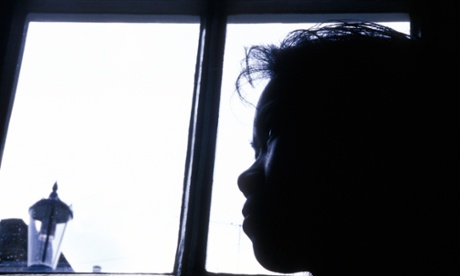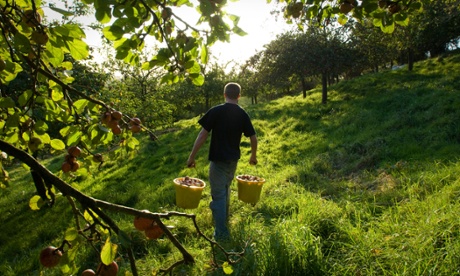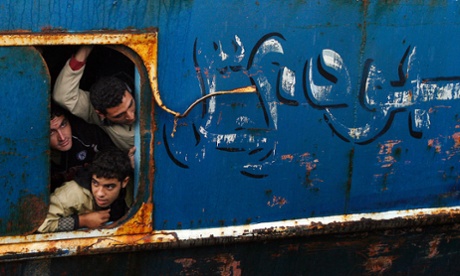The government’s proposed immigration bill, due to have its first reading in the House of Lords this week, will hand “unbelievable control to traffickers” and make it harder for people to escape slavery in the UK, campaigners have warned.
Anti-slavery NGOs and labour rights activists said a climate of fear around immigration would result in trafficking victims being treated as illegal workers rather than victims of crime. A key proposal in the bill concerns illegal working, which will carry a 12-month sentence and unlimited fine. Trafficking experts said this would deter victims from coming forward to report abuse.
Caroline Robinson, policy director at the Focus on Labour Exploitation (Flex), said: “We have serious concerns that the immigration bill will make people more vulnerable. The proposed legislation hands unbelievable control to traffickers. The purpose of this illegal working offence is to find people and get them out of the country and our fear is that victims won’t want to come forward because of the immigration consequences.”
Robinson said her organisation had already seen the impact of tougher immigration policies, with victims of trafficking too scared to approach authorities.
“We worked with a cleaner [who was a victim of trafficking] who doesn’t want to come forward because of the gamble that there will be immigration repercussions. Even when the Home Office agrees someone is a victim of trafficking there is not much support, so, after the 45-day recovery period, you are left destitute or forced out of the UK, with a very real risk of retrafficking.”
After winning the general election in May, David Cameron promised a clampdown on illegal migration across all areas of government to “make the UK a less attractive place for illegal migrants”. Cameron said this would be done by “rooting out illegal immigrants and bolstering deportations”.
Under the proposed bill, banks would be required to establish whether customers were in the UK legally and landlords would have to check tenants’ documents regularly. If landlords believed a tenant to be in the UK illegally, they would be able to evict them without a court order.
Chai Patel, legal and policy director for the Joint Council for the Welfare of Immigrants, believes document checks will have a negative impact on trafficking victims. “It makes it a lot easier for wages to be withheld and the housing provisions will mean people are forced to deal with landlords who are criminals,” he said.
Patel added that the measures in the bill threatened to undo the work of the Modern Slavery Act, introduced last year.
He said: “It’s already a criminal offence to be here unlawfully but now the powers will be extensive. They can seize anything you earn, take whatever people have. Victims [of trafficking] will be admitting a criminal offence just by saying they have been exploited. That is what traffickers rely on and they can rightly say you can’t tell anyone because you will be arrested and put in prison, and that is what might well happen. It really does contradict everything in the modern slavery bill.”
The Home Office has said victims of trafficking will not be affected by the new immigration bill and will receive substantial protection from prosecution under the Modern Slavery Act. The act introduced a new statutory defence for victims who commit crime due to their exploitation, and this defence applies to those who are forced to work illegally.
Karen Bradley, UK minister for preventing abuse and exploitation, said in a statement: “The intent of the offence of illegal working is clear; it is not aimed at the victims of modern slavery. Anyone who is a victim of modern slavery can at any time report their captors, and last week the home secretary announced a specific helpline for victims to ring or text for help.”
The national referral mechanism (NRM), the main system for identifying and protecting victims of trafficking in the UK, was widened by the slavery bill to apply to all victims of modern-day slavery.
But anti-trafficking groups have branded the protection system inadequate. The government has also faced criticisms over its record of persistently criminalising victims of trafficking.
“If the new immigration legislation is effectively going to strengthen the position of traffickers, it is difficult to see how the NRM is going to be an adequate response to that,” said Aidan McQuade, director of Anti-Slavery International.
McQuade complained of an “inbuilt institutional racism” in the NRM system, with migrants from EU countries much more likely to be confirmed as trafficking victims than those from elsewhere. “You have less than a 20% chance if you’re from outside the EU of being positively identified as a victim of trafficking,” said McQuade. “It’s hard to see how the current climate around immigration is going to do anything to counteract that.”
The most recent data from the National Crime Agency shows that between April and June 2015, there were 757 referrals to the NRM. Of these, 167 people received positive identification as a victim of trafficking.
The most common countries of origin among people who received a positive identification as a victim of trafficking were the UK, Poland, Romania and Slovakia. Those who did not make it through to the final stages of the NRM process were typically from Vietnam, Albania, Nigeria and Eritrea.
The standard recovery period for trafficking victims is 45 days. Between January 2010 and September of this year, 1,200 recognised victims of trafficking applied for asylum. Two-thirds were given some form of leave to remain, while a third had to leave the UK.
The Labour MP Fiona Mactaggart said pressure to leave the UK after a positive identification as a trafficking victim has stopped people entering the NRM process: “If people are trafficked they usually have 45 days after the [Home Office] decision [to stay in the UK], then they are dropped like a stone. The problem is that someone who has been a victim of trafficking, often for many reasons, cannot return to their country of origin, for example because their traffickers are threatening them and their families.
“Too often they try to find something to preserve their lives and so they might work illegally or they might revert to prostitution, simply because they need to eat. Because of hysteria around immigration we allow profoundly vulnerable people to drop off the edge and they can’t give evidence against cruel, monstrous criminals.”











